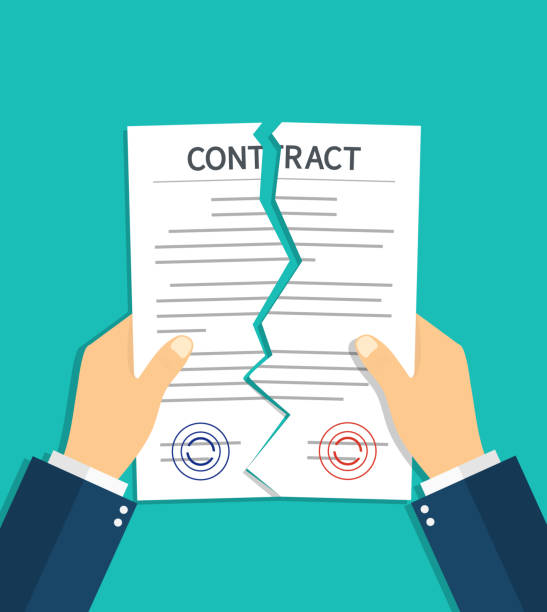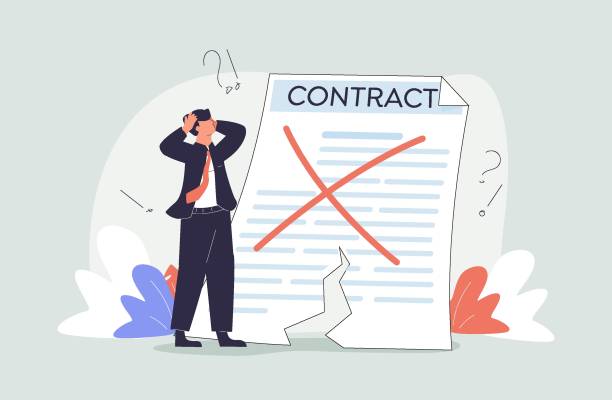Understanding Contract Breaches: A Detailed Guide

Contracts form the backbone of many professional relationships, defining responsibilities, and outlining possible repercussions if obligations aren’t met. But what happens when someone breaches a contract? This guide, “Handling a Contract Breach: Tips and Best Practices,” will delve into this pressing question and offer valuable advice for those navigating these stormy waters.
Handling a Contract Breach: Tips and Best Practices
When faced with a contract breach, the most important initial step is not to panic. It’s a challenging situation, but with the right approach and knowledge, you can effectively navigate through it. Let’s dive in.
Understanding What a Contract Breach Is
To properly handle a contract breach, you must first understand what constitutes a breach. In essence, a contract breach occurs when one party fails to fulfill their obligations as laid out in the contract. The type of breach can vary and is usually classified into four categories:
1. Material Breach
2. Minor Breach
3. Anticipatory Breach
4. Actual Breach
Let’s take a closer look at these categories.
Material Breach
A material breach is a major violation, one so severe that it renders the contract irreparable. In such cases, the injured party is often released from their responsibilities and can seek damages.
Minor Breach
A minor breach, or partial breach, is when the violating party fails to perform a minor aspect of the contract. While it doesn’t completely derail the agreement, the injured party may still claim damages.
Anticipatory Breach
This breach occurs when one party indicates, before the due date of performance, that they will not uphold their end of the agreement. The other party can immediately consider the contract breached and seek remedies.
Actual Breach
An actual breach transpires when one party fails to fulfill their duties when performance is due.
Recognizing the Signs of a Breach
Recognizing a contract breach requires a keen eye and understanding of the contract. Keep an eye out for these signs:
1. Non-Performance: The most apparent sign, non-performance is when one party fails to perform their duties as per the contract.
2. Incomplete Performance: This involves partially fulfilling obligations.
3. Delayed Performance: Timeliness is crucial in contracts, and delayed delivery can also amount to a breach.
4. Inferior Performance: Delivering work or goods that are inferior to what was agreed upon is another form of breach.
Consequences of a Contract Breach
Contract breaches have several consequences, mainly involving legal and financial repercussions. It may lead to:
1. Lawsuits: The injured party can take the case to court to seek justice and remedies.
2. Damages: Financial compensation may be demanded to cover losses caused by the breach.
3. Contract Termination: A severe breach can lead to contract termination.
Handling a Contract Breach: Steps to Take
When dealing with a contract breach, follow these steps:
Step 1: Review the Contract
First things first, review the contract in detail. Ensure that a breach has indeed occurred and that your actions are justified under the agreement’s terms.
Step 2: Gather Evidence
Next, gather all relevant evidence of the breach. This could include email exchanges, invoices, delivery receipts, etc. This documentation will be crucial if legal action is necessary.
Step 3: Contact a Lawyer
If the breach is significant, it may be wise to contact a lawyer. They can provide guidance tailored to your situation and help you understand your rights and options.
Step 4: Reach Out to the Other Party
Communication is key. Reach out to the breaching party to discuss the issue. They may not be aware they’re in breach, or there may be a simple resolution.
Step 5: Seek Remedies
If resolution isn’t possible, you may seek legal remedies. This could include suing for damages, enforcing the contract, or seeking to cancel the contract.
Best Practices When Handling a Contract Breach
If you’re in the unenviable position of dealing with a contract breach, these best practices can help guide your response:
Stay Calm and Professional
Keeping a cool head is crucial. Getting overly emotional can cloud judgment and lead to rash decisions. Maintain professionalism throughout the process.
Document Everything
Ensure every interaction, agreement, and transaction related to the breach is well-documented. These documents can prove vital during legal proceedings.
Seek Legal Counsel
Navigating contract breaches can be complex. It’s usually beneficial to have a knowledgeable attorney guide you through the process.
Explore Out-of-Court Resolutions
Court proceedings can be lengthy and costly. If possible, explore alternative dispute resolution methods, such as mediation or negotiation.
Understand Your Rights
Knowledge is power. Familiarize yourself with your legal rights and remedies under the contract and your jurisdiction’s laws.

Frequently Asked Questions
1. What are some common types of contract breaches?
Common types include material breaches, minor breaches, anticipatory breaches, and actual breaches. Each has distinct characteristics and legal implications.
2. What is the first step in handling a contract breach?
The first step is to review the contract in detail to verify a breach has indeed occurred and to understand the terms of the contract.
3. How can I prove a contract breach?
Proof often comes in the form of documented communication, invoices, receipts, or any other relevant evidence demonstrating the other party’s failure to meet their contractual obligations.
4. Should I always take legal action if a breach occurs?
Not necessarily. In some cases, the breach may be due to a misunderstanding, and open communication can lead to resolution. However, if the breach is severe and harmful, legal action may be necessary.
5. What are some potential consequences of a contract breach?
Potential consequences include lawsuits, financial damages, and contract termination.
6. What are some best practices for handling a contract breach?
Stay calm and professional, document everything, seek legal counsel, explore out-of-court resolutions, and understand your rights.
Conclusion
Dealing with a contract breach can be daunting, but armed with knowledge and best practices, you can handle such situations with confidence. Remember, understanding the breach, documenting evidence, seeking legal counsel, and maintaining clear communication are vital steps in effectively handling a contract breach.
External Links/ Sources:
Breach of Contract Explained: Types and Consequences
